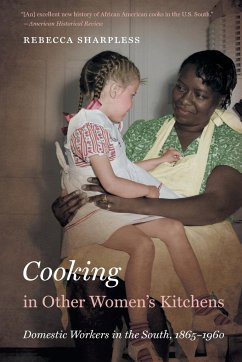As African American women left the plantation economy behind, many entered domestic service in southern cities and towns. Cooking was one of the primary jobs they performed, feeding generations of white families and, in the process, profoundly shaping southern foodways and culture. Rebecca Sharpless argues that, in the face of discrimination, long workdays, and low wages, African American cooks worked to assert measures of control over their own lives. As employment opportunities expanded in the twentieth century, most African American women chose to leave cooking for more lucrative and less oppressive manufacturing, clerical, or professional positions. Through letters, autobiography, and oral history, Sharpless evokes African American women's voices from slavery to the open economy, examining their lives at work and at home.
Hinweis: Dieser Artikel kann nur an eine deutsche Lieferadresse ausgeliefert werden.
Hinweis: Dieser Artikel kann nur an eine deutsche Lieferadresse ausgeliefert werden.








